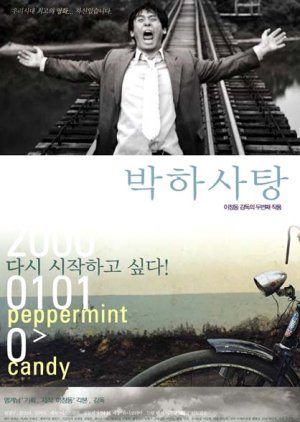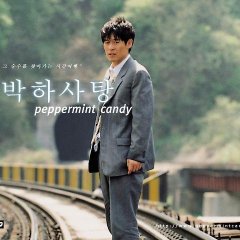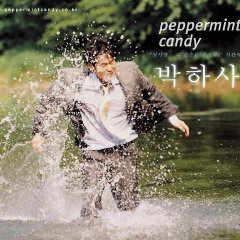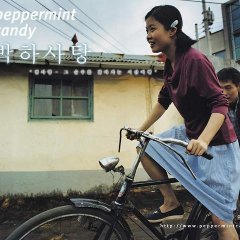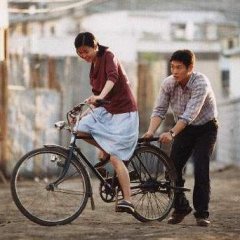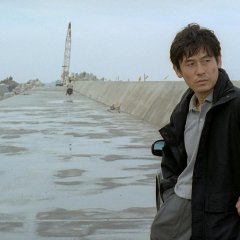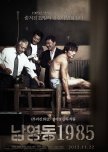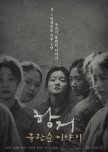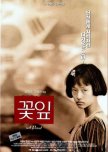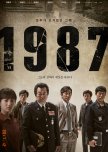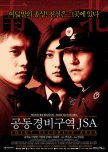- Français
- English
- magyar / magyar nyelv
- dansk
- Titre original: 박하사탕
- Aussi connu sous le nom de: Bakhasatang , Bakha Satang
- Scénariste et Réalisateur: Lee Chang Dong
- Genres: Militaire, Drame
Distribution et équipes
- Sol Kyung GuKim Yong HoRôle principal
- Moon So Ri Rôle principal
- Kim Yeo Jin Rôle principal
- Seo JungMs. RiRôle Secondaire
- Go Seo HeeKyeong AhRôle Secondaire
- Lee Dae YeonChief Kang / Detective KangRôle Secondaire
Critiques

unterwegsimkoreanischenD
23 personnes ont trouvé cette critique utile
Cette critique peut contenir des spoilers
Not nice to watch but definitely worth seeing. Superbly done in many ways. Powerful. Resonating.
Prolog:The conclusion for the protagonist in his late 30s is rather tragic: he´s getting the urge to go back. He wants the life of his late youth back. He cannot continue with who he is today. For him, there is only one option remaining – a shortcut to the exit.
However, for the audience, the end is actually the beginning. The journey goes backwards in seven chapters. And when we finally reach the start, it actually makes sense to look at the ending again... (in movie-terms: its beginning...)
-------------------------------------------------- ----
“Peppermint Candy” was one of the top ten movies in 2000. The international awards it collected are respectable. And even in 2022, “The Guardian” has it listed in 12th place among South Korean film classics. Meaning: It was topical back then and still hasn’t lost its impact. It´s cult. It can be considered particularly valuable. However, it´s not particularly nice, though. Rather particularly powerful and ferociously intense.
"Peppermint Candy" dates from 1999. It tells the story of the previous two decades of South Korean history using the example of an arbitrary, inconspicuous individual. For audience who isn´t firm in recent South Korean history, the KMovie may be reduced to the protagonist as an individual - to his very personal story and his tragic ending. For all those who know something about the historical, social background (see the side note below if you like), the KMovie becomes a memorial on screen that commemorates all those in society who were probably thus affected in one way or another, too, and may have had a similar experience. And there were quite a few.
In 1999, South Korea looked back on two extremely eventful decades. Two decades that were endured, sustained, borne by the people... Two decades that, in addition to democracy, turbo-capitalism and material prosperity, also produced a whole series of psychological cripples.
I actually don't like the word 'cripple', but somehow it seems appropriate in this case, here in the sense of: people who were maltreated by others or 'by life´s circumstances' to the point of psychic unconsciousness (even if perhaps they themselves were involved as perpetrators, too). People who were broken by their fate and trauma, not being allowed to and/or able to talk about it. People who fell, lost themselves, could no longer get back on their feet, feeling helpless. Completely bent. People who could not find peace with their shame and guilt. In their inability to communicate about it and get help, they became a total human failure for those around them.
In reverse "Peppermint Candy" portrays the career of such a psychological (and physical) 'cripple' in intense scenes. We may acknowledge the individual fate. Even without historical background and regardless of socialization, we acknowledge a broken soul, of which all that is left to the outside world is actually an 'asshole'. Once a poetic, delicate, sensitive spirit... it´s hard to believe. Actor Sol Kyung-gu expands the entire range of his skills, convincingly and uncompromisingly drawing the audience into each of his divers crucial, rather unpleasant emotional life situations.
“Peppermint Candy” is superbly done in many ways. Not too much, not too little. Ruthless. And in pointed, symbolic imagery, the scenes gain in emotional power and meaningfulness as they progress - even after we have travelled a few sequences further (back) - to the extent that the puzzle of drastic life events accumulated are coherently put together into a pile of shards.
The protagonist in "Peppermint Candy" is experiencing the significant historic events of his generation at the forefront. His psychical downward spiral cannot be stopped. But this protagonist is no exception. Countless people in their late thirties in South Korea in 1999 could have told such or similar stories. During those traumatizing two decades the public was carelessly left alone to individually deal with what had happened. What a person experienced emotionally, what a person had to process and couldn't, the decisions made, the guilt, the shame, the pain – the answer to that was mainly psychological repression and silence about it. The consequences in everyday life: Outbursts of acting up and/or apathy. Sometimes the old wound hurts again. The old wound makes man fall to the ground, by its pain that he cannot escape. But it is also a phantom pain - the desperate suffering over an essential piece of 'who I am' that was taken away once and for all...
The protagonist in "Peppermint Candy" suffers on behalf of an entire generation of anonymous young people who were quietly worn down, deeply psychologically shattered and finally by the two decades of the 80s and 90s, the time of transition from military dictatorship to modern capitalism existentially bankrupt. The KMovie reaches out to all those who may have had a similar experience and/or were able to sympathize. Where communication had been lacking for decades, the KMovie, with its sometimes disturbing insights, tries to build a bridge: with understanding that may even extend to empathy. "Peppermint Candy" manages to connect the South Korean people through the fate of this one fictional man and his personal environment. (Additionally, it may even touch the rest of the world). Yongho, who could be 'anyone', and with him the women in his life, his friends (?), his colleagues and his victims who had crossed his path, who could also be 'anyone'…
Not nice to watch. But definitely worth seeing.
Powerful. Resonating. A convincingly empathetic work.
A work of passion.
--------------------------------------------------------------------------------
SIDE NOTE: --- Brief overview of the historical background of South Korea - regarding May 1980 in Gwangju, the 1980s under repressive police violence, and the years of economic miracle up to the Asian crisis of 1997-1999. ---
May 1980 in Gwangju, South Korea, featured a bloody massacre that the police and military were ordered to carry out on their own people. Yet, that massacre of Gwangju remained an official taboo for almost two decades. What happened in Gwangju back then was kept secret from the rest of the country. Then, the city was deliberately cordoned off. The enemy was officially called 'communism' (especially in student circles, supposedly under the infiltrated influence of North Korea.)
Those who survived May 1980 in Gwangju and perhaps could or would have wanted to talk about it were pressured, persecuted, tortured and put in camps. The others who preferred to remain silent had to figure out by themselves how to emotionally digest what had happend.
President Chun Do-hwan, who succeeded his predecessor Park Chung-hee in the aftermath of the bloody spring of 1980, did not create any less autocratic structures for the common people than before with his dictatorship. On the contrary. With him, brutal torture was carried out in the spirit of a systematic cleansing. The years of Chun Do-hwan's rule were some of the worst for South Korea in terms of political repression. His mission: The country should use all its might to present itself to the rest of the world as dazzling and up-and-coming until the Olympic Games. Whatever/whoever was bothersome was put away. However, the autocratic rule of the dictator and his brutal power apparatus with police and secret service ended in 1987 as a result of unbridled, enormous public pressure. The people's longing for democracy was finally able to prevail.
Parallel to the repression under Chun Do-hwan, the 1980s and following years were characterized by the years of economic miracle. The market became increasingly liberalized and it was all about exports. Yet, on a large scale growth and prosperity were built on credit: direct investments from abroad, credit cards for the people in the country, loan sharks for all those smaller companies that couldn't get the money from the banks. But the bubble of the expansive credit economy of the 1990s burst in 1997 with the Asian crisis. The credit boom was followed by a crash, an enormous fall in the value of the won, a series of bankruptcies, unemployment all over the place and poverty for the many.
Even though South Korea got back on its feet astonishingly quickly in the course of the subsequent years of the so called IMF Economic Crisis, the path was marked by countless fates of bankruptcies and many families suffering from for a long time since.
Cet avis était-il utile?

One might notice something unusual about Peppermint Candy straightaway: it’s backwards. It affects a non-linear structure, forcing the viewer to witness the lead’s story in reverse chronology. We start with a broken maniac ready to commit suicide on some train tracks, and end with a starry-eyed youth, happy and in love. What must have happened between these two points to result in such a drastic change?
That is what the viewer must uncover, journeying back through the years 1999 to 1979. The film separates into several segments to allow this, pinpointing only the most important details of the character’s life.
These specific years represent tremendous importance to the narrative, especially those sequences spent in the 1980’s. That decade was a particularly troubled one for South Korea; police brutality and government-sanctioned violence were not uncommon, as seen from the infamous protest crackdowns portrayed here in unabashed detail. The country many of us know and love today was a totally different place in that era.
Peppermint Candy relies heavily on visual motifs, particularly moving trains and the namesake sweets themselves. Trains appear at pivotal moments, usually during (or after) an unfortunate action taken by the lead. When I noticed this happening, the effect chilled; my stomach automatically dropped and I almost felt cold. Because the story segments are also broken up by footage taken from the back of a train, the effect is twofold. Note also the pensive string music which accompanies these instances. Other details become apparent over the course of the film; names and objects which make no sense in one part suddenly burst with recognition in another.
After seeing him as Kim Yong Ho, our tragic main character, Sol Kyung Gu definitely has my respect as an artist. He impressed unilaterally, whatever incarnation of the man he needed to portray. I hated and feared Yong Ho, I judged and even pitied him—but above all, I understood him. All this thanks to a masterful performance by a true talent. Moon So Ri also acted memorably, despite appearing very little; her Yun Sun Im was so built up, so discussed, over the course of the film, that it would have been easy to disappoint. She did not. The supporting cast does just as well, playing off the leads without drawing away focus.
Those viewers who devour character studies, art films, powerful acting, or are just looking for something different might take interest in Peppermint Candy. Please be warned that this movie contains varying degrees of violence, brief nudity, and depicts suicidal tendencies. Certain scenes can be disturbing.
Cet avis était-il utile?

